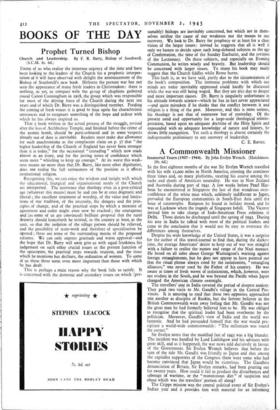BOOKS OF THE DAY
Prophet Turned Bishop
Church and Leadership. By F. R. Barry, Bishop of SouthwelL (S.C.M. 8s. 6d.)
THOSE of us who realise the immense urgency of the time and have been looking to the leaders of the Church for a prophetic interpre- tation of it will have observed with delight the announcement of the Bishop of Southwell's new book. Hitherto the present war has not seen the appearance of many fresh leaders in Christendom: there is nothing, as yet, to compare with the group of chaplains gathered round Canon Cunningham in 1918, the group which was responsible for most of the driving force of the Church during the next ten years and of which Dr. Barry was a distinguished member. Pending the coming of fresh voices it is good to hear again his characteristic utterances and to recapture something of the hope and ardour with which he has always inspired us.
That a book written in the actual process of the struggle, revised after the loss of Archbishop Temple, and finished before the crime of the atomic bomb, should be parti-coloured and in some 'respects already out of date is inevitable. Readers must make due allowance for such anachronisms as the complacent claim on p. 57 that " the higher leadership of the Church of England has never been stronger than it is today," for the occasional " crusading " which now reads almost as an irony, and for the jarring notes of confidence which seem mere " whistling to keep up courage." At its worst this weak- ness means no more than that Dr. Barry, like most other dignitaries, does not realise the full seriousness of the position as it affects institutional religion.
Recognising this, we can enjoy the wisdom and insight with which the educational, liturgical and organisational needs of the Church are interpreted. The insistence that theology even in a post-critical age (whatever this means) must be and can be at once dogmatic and liberal ; the excellent treatment of worship, of the value and limita- tions of our tradition, of the necessity, the dangers and the prin- ciples of change, and of the practical steps by which a measure of agreement and order might even now be reached ; the courageous and (as some of us are convinced) brilliant proposal that the rural deanery should henceforth be treated, in the country at least, as the unit, so that the isolation of the village parson should be relieved, and the possibility of team-work and therefore of specialisation be opened ; these, are some of the outstanding merits of the proposed reforms. We can only express gratitude and warm approval—and the hope that Dr. Barry will soon give us with equal frankness his judgement on such, other crucial issues as the present function of the episcopate, the practical steps towards reunion, and the issue which he mentions but declines, the ordination of women. To some of us these three 'seem even more important than those with which
he has dealt. - This is perhaps a main reason why the book fails to satisfy. It is concerned with the domestic and secondary issues on which (pre-
sumably) bishops are inevitably concerned, but which are in them- selves neither the cause of our weakness nor the means to our recovery. We look to Dr. Barry for prophecy or at least for a clear vision of the larger issues: instead he suggests that all is well if only we hasten to decide upon such long-debated subjects as the age of Confirmation, the time of the Sunday Eucharist, and the revision of the Lectionary. On these subjects, and especially on Evening Communion, he writes wisely and bravely. But leadership should be concerned with larger issues. To many his book may easily suggest that the Church fiddles while Rome burns.
This fault is, as we have said, partly due to the circumstances of the book's composition. The immense problems with which our minds are today inevitably oppressed could hardly be discussed while.the war was still being waged. But they are also due to deeper and more important causes. Dr. Barry is singularly unfortunate in his attitude towards science—which he has in fact never appreciated —and quite mistaken if he, thinks that the conflict between it and religion is a thing of the past. Moreover, and this is most serious, his theology is not that of tomorrow but of yesterday. Of the present need and opportunity for a large-scale theological reinter- pretation, based upon an adequate doctrine of the Holy Spirit and expounded with an adequate knowledge of nature and history, he shows little recognition. Yet such a theology is almost certainly the indispensable preliminary to any recovery of leadership.
C. E. RAVEN.






























 Previous page
Previous page